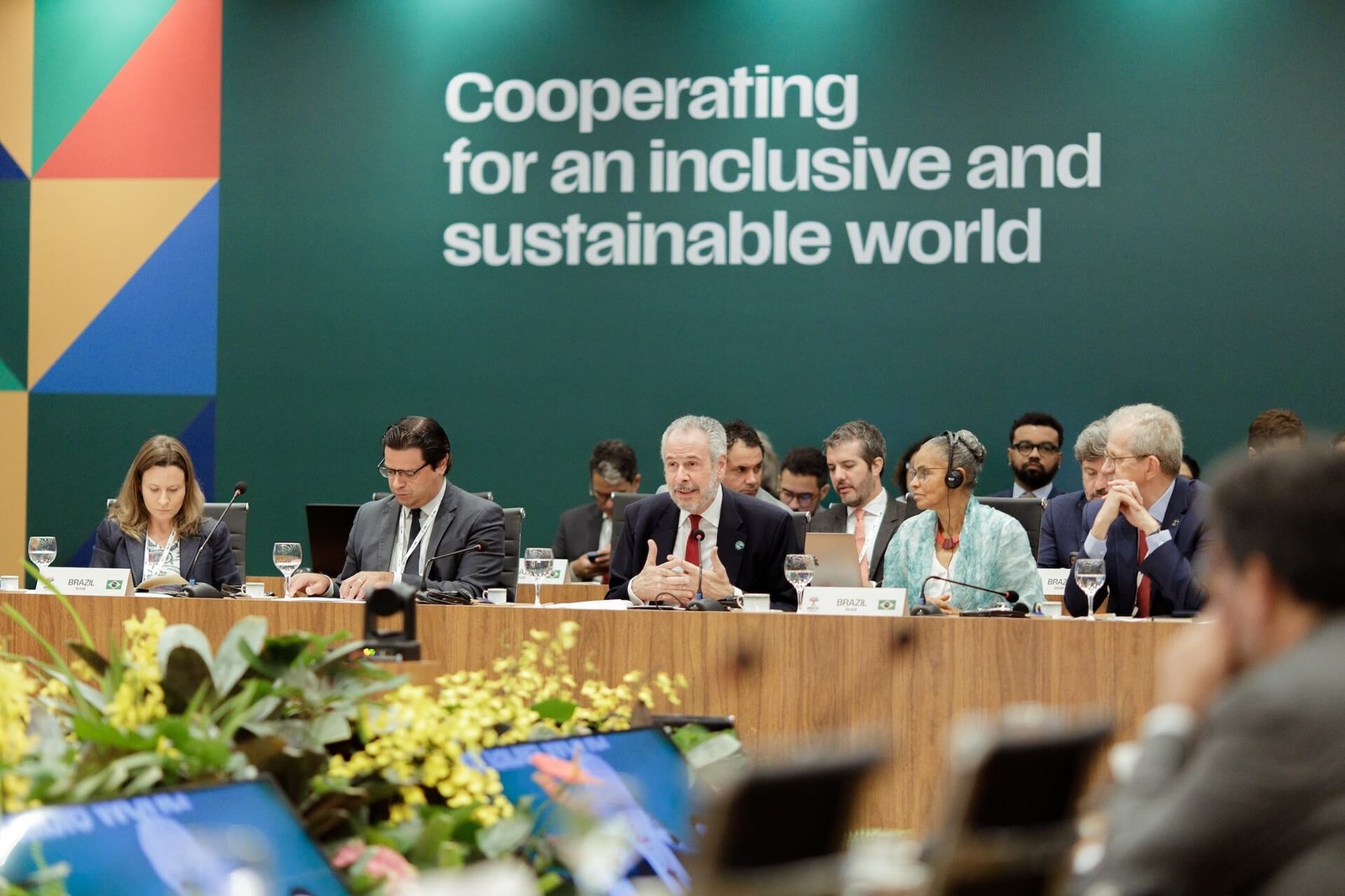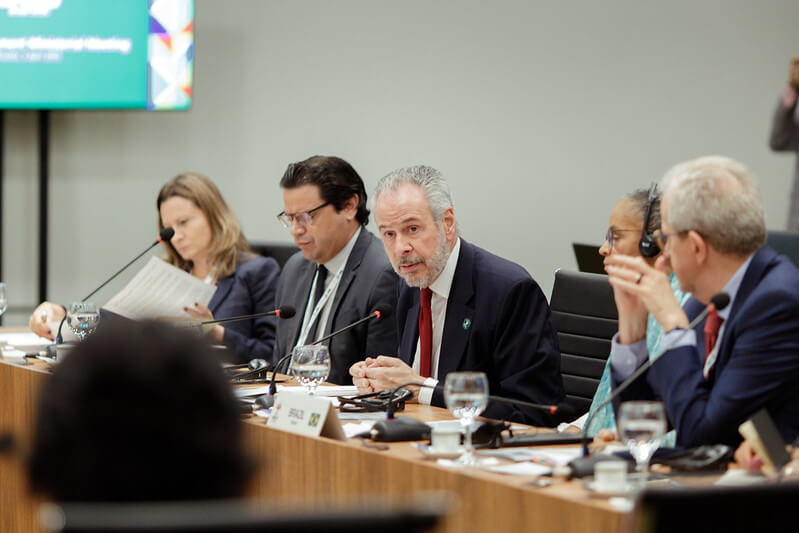BRICS approves environment declaration with priorities for COP 30
BRICS is also under the Brazilian presidency, and it included the importance of NDCs and climate finance for sustainable development. COP 30 President André Corrêa do Lago and the Conference's CEO in Brasil, Ana Toni, joined the event.

By Mayara Souto | mayara.souto@presidencia.gov.br
On April 3, BRICS environment ministers adopted a statement outlining their priorities for COP30, with a key focus on updating Nationally Determined Contributions (NDCs) and accelerating climate finance. The issues will be considered by the leaders at the Leaders' Summit, to be held in Rio de Janeiro in July.
"We recognize the critical impacts of climate change and the need to accelerate implementation for mitigation and adaptation. We stress the importance of the Paris Agreement and reiterate our commitment to each country's Nationally Determined Contribution (NDC), reflecting national capacities and circumstances. We encourage technology transfer and adequate climate finance for developing countries," said the statement.
COP30 President, who attended the meeting hosted by Itamaraty in Brasilia, stressed the importance of the group's participation in debates on Brasil's priorities ahead of the world's largest climate change forum.
"BRICS represents almost 50% of the world's population and almost 40% of the world's GDP (gross domestic product). So it's a key group, both geopolitically and economically. And of course, when we talk about the economy, it has everything to do with the issue of climate change, because the solutions are naturally related to changes in the economies of countries," the Ambassador said.
COP30 CEO Ana Toni also highlighted the integration of agendas of BRICS and COP 30, both held under the Brazilian presidency this year. "We've seen the very strong support of the BRICS for COP 30, and we're very grateful. I think the message that the COP30 presidency and Brasil are launching, to accelerate the implementation of climate action, can also be seen in the BRICS," he said.
"As this is the year of COP30, and considering that our countries represent half of the population and more than 30% of the global GDP, we have a very important role to play. About 80% of the emissions and the money are in the developed countries, but we also have a significant share of the money and, above all, of the population," said Marina Silva.
Financing
Climate finance that is "adequate for developing countries" is mentioned as important in the letter adopted by the BRICS ministers. This highlights Brasil's challenge at this COP to work towards achieving USD 1.3 trillion of investment from developed countries to less developed countries by 2035 to address the climate crisis. At COP 29 in Baku, Azerbaijan, the figure was only USD 300 billion.

"BRICS represents almost 50% of the world's population and almost 40% of the world's GDP (gross domestic product). So it's a key group, both geopolitically and economically. And of course, when we talk about the economy, it has everything to do with the issue of climate change, because the solutions are naturally related to changes in the economies of countries."
"The finance agenda is always highlighted, especially as this is a meeting of developing countries. A significant number of them are countries that don't have the necessary means to implement the commitments they have made, others are upper middle income countries that have already done their homework, even if they don't have external support, but that doesn't mean that there isn't an emphasis on making those means viable," said Marina Silva.
Tropical Forest Finance
“Developed countries have commitments under the Agreement, and we all stress this strongly. But we realized that we are already doing South-South cooperation, some with resources, some doing their homework, others even providing technology for the ecological transformation of the planet and creating innovative financing mechanisms, as is the case with the TFFF,” said the Environment Minister, referring to the Brazilian proposal to create the Tropical Forest Finance Facility(TFFF) for forest conservation. The tool should be launched during COP 30 in Belém, Pará, to be held on November 10-21 this year.
Corrêa do Lago stressed that the creation of the TFFF is an innovation in Brasil. “Forest financing exists in different forms for each type of activity, although it can be summarized in three dimensions. Some countries already have it for tackling deforestation, called Redd+, in the Climate Convention. In Brasil, for example, this type is the Amazônia Fund. For forest conservation, you have the possibility of a carbon market, another way of recovering CO² (carbon dioxide) that was already emitted. The third major challenge is forest conservation. There was no formal mechanism for this. The TFFF addresses exactly that. So it's a Brazilian proposal that seeks to solve a problem that hasn't been solved yet,” she said.
Still within the BRICS framework, Ana Toni said that at the ministerial meeting, the group approved the production of a report with the amounts that each of the eleven member countries is already investing to deal with the climate crisis through mitigation and adaptation actions.
“This accounting is important for countries to understand what their contribution has been, but it doesn't take away from the responsibility of developed countries in their commitment to lead the mobilization of resources for developing countries to make this transition. We're not waiting for the resources to come, but we're already spending resources, for example in Brasil, to combat deforestation, even though we also have cooperation resources,” explained the CEO of COP 30.
NDCs
Regarding the NDCs, the report stresses the importance of each country adopting its targets and updating them. So far, only 196 parties to the United Nations Framework Convention on Climate Change (UNFCC)submitted updates of the Paris Agreement targets from ten years ago. Among the eleven BRICS countries, only Brasil and the United Arab Emirates have updated their targets.
“Brasil did its homework and presented in Baku the goal of reducing greenhouse gas emissions by 59% to 67% by 2035, compared to 2005,” said Minister Marina Silva.
The deadline for submitting the new measures is September this year. According to Ana Toni, CEO of COP 30, the President of Brasil, Luiz Inácio Lula da Silva, and the Secretary General of the United Nations (UN), António Guterres, held a meeting with countries this month to call for efforts to deliver the new climate targets on time.
“This work to encourage countries to send in their NDCs as quickly as possible, but with quality, is something that President Lula, with Secretary General Guterres, is doing on an ongoing basis. In April, the meeting will be held, calling countries to discuss the importance of submitting their NDCs,” said the CEO of COP 30.
English version: Trad. Bárbara Menezes
Proofreading: Enrique Villamil
